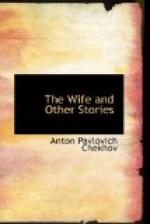I assured myself that my love had died long ago, that I was too much absorbed in my work to think seriously of my relations with my wife. But, alas! that was only what I imagined. When my wife talked aloud downstairs I listened intently to her voice, though I could not distinguish one word. When she played the piano downstairs I stood up and listened. When her carriage or her saddlehorse was brought to the door, I went to the window and waited to see her out of the house; then I watched her get into her carriage or mount her horse and ride out of the yard. I felt that there was something wrong with me, and was afraid the expression of my eyes or my face might betray me. I looked after my wife and then watched for her to come back that I might see again from the window her face, her shoulders, her fur coat, her hat. I felt dreary, sad, infinitely regretful, and felt inclined in her absence to walk through her rooms, and longed that the problem that my wife and I had not been able to solve because our characters were incompatible, should solve itself in the natural way as soon as possible—that is, that this beautiful woman of twenty-seven might make haste and grow old, and that my head might be grey and bald.
One day at lunch my bailiff informed me that the Pestrovo peasants had begun to pull the thatch off the roofs to feed their cattle. Marya Gerasimovna looked at me in alarm and perplexity.
“What can I do?” I said to her. “One cannot fight single-handed, and I have never experienced such loneliness as I do now. I would give a great deal to find one man in the whole province on whom I could rely.”
“Invite Ivan Ivanitch,” said Marya Gerasimovna.
“To be sure!” I thought, delighted. “That is an idea! C’est raison,” I hummed, going to my study to write to Ivan Ivanitch. “C’est raison, c’est raison.”
II
Of all the mass of acquaintances who, in this house twenty-five to thirty-five years ago, had eaten, drunk, masqueraded, fallen in love, married bored us with accounts of their splendid packs of hounds and horses, the only one still living was Ivan Ivanitch Bragin. At one time he had been very active, talkative, noisy, and given to falling in love, and had been famous for his extreme views and for the peculiar charm of his face, which fascinated men as well as women; now he was an old man, had grown corpulent, and was living out his days with neither views nor charm. He came the day after getting my letter, in the evening just as the samovar was brought into the dining-room and little Marya Gerasimovna had begun slicing the lemon.
“I am very glad to see you, my dear fellow,” I said gaily, meeting him. “Why, you are stouter than ever....”
“It isn’t getting stout; it’s swelling,” he answered. “The bees must have stung me.”
With the familiarity of a man laughing at his own fatness, he put his arms round my waist and laid on my breast his big soft head, with the hair combed down on the forehead like a Little Russian’s, and went off into a thin, aged laugh.




